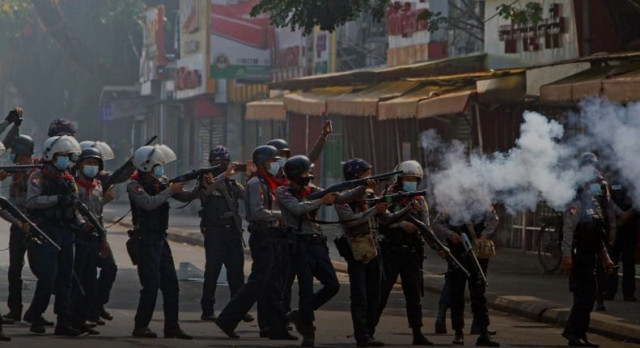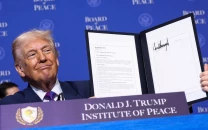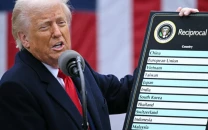Myanmar police fire to break up protests as ASEAN diplomatic effort stalls
Foreign Ministers from Southeast Asian neighbours urged restraint

Myanmar security forces opened fire in several places on Wednesday to break up anti-junta protests and several people were hurt, media reported, a day after a regional diplomatic push to end the month-long crisis made little headway.
Foreign Ministers from Southeast Asian neighbours urged restraint but failed to unite behind a call for the military to release ousted government leader Aung San Suu Kyi and restore democracy.
At least 21 people have been killed since a military coup on Feb. 1 ended Myanmar’s tentative steps towards democratic rule and triggered protests across the country and international dismay.
Security forces fired rubber bullets and tear gas at protesters in several places, including the main cities of Yangon and Mandalay, and there were also reports of live ammunition being used in some places.
“Oh my eyes, it hurts,” one woman in a teacher’s uniform shouted as she and other protesters scattered through a cloud of tear gas in the second city of Mandalay, according to a live video feed.
Nine people were hurt when police fired rubber bullets in Mandalay, the Myanmar Now news agency reported.
The Monywa Gazette reported five people were wounded when security forces fired live ammunition in that central town and there were also unconfirmed reports of firing and injuries in the two other central towns, Myingyan and Magway.
A spokesman for the ruling military council did not answer telephone calls seeking comment.
The security forces detained about 400 protesters as they broke up protests in Yangon, Myanmar Now reported. One activist said several protest leaders were among those taken away.
Video posted on social media showed long lines of young men, hands on heads, filing into army trucks as police and soldiers stood guard. Reuters was not able to verify the footage.
Protesters were also out in Chin State in the west, Kachin State in the north, Shan State in the northeast, the central region of Sagaing and the south, media and residents said.
“We’re aiming to show that no one in this country wants a dictatorship,” Salai Lian, an activist in Chin State, told Reuters.
‘NO MORE WORDS’
On Tuesday, the Association of Southeast Asian Nations (ASEAN) failed to make a breakthrough in a virtual foreign ministers’ meeting on Myanmar.
While united in a call for restraint, only four members - Indonesia, Malaysia, the Philippines and Singapore - called for the release of Suu Kyi and other detainees.
“We expressed ASEAN’s readiness to assist Myanmar in a positive, peaceful and constructive manner,” the ASEAN chair, Brunei, said in a statement.
Myanmar’s state media said the military-appointed foreign minister attended the ASEAN meeting that “exchanged views on regional and international issues”, but made no mention of the focus on Myanmar’s problems.
It said Wunna Maung Lwin “apprised the meeting of voting irregularities” in November’s election.
The military justified the coup saying its complaints of voter fraud in the Nov. 8 elections were ignored. Suu Kyi’s party won by a landslide, earning a second five-year term. The election commission said the vote was fair.
Junta leader Senior General Min Aung Hlaing has said the intervention was to protect Myanmar’s fledgling democracy and has pledged to hold new elections but given no time frame.
Singapore Prime Minister Lee Hsien Loong said on Tuesday in an interview the coup was a “tragic” step back for Myanmar and the use of lethal force by its security forces was “disastrous”.
ASEAN’s bid to find a way out of the crisis has drawn criticism from inside Myanmar, with concern it would legitimise the junta and not help the country.
“No more words, action,” activist Thinzar Shunlei Yi told Reuters in a message when asked about the ASEAN effort. She called for sanctions on businesses linked to the military.
Tuesday evening’s news bulletin on Myanmar state television said agitators were mobilising people on social media and forming “illegal organisations”.
It said tear gas and stun gun grenades were used to disperse crowds in Yangon and 12 rioters were arrested.
Suu Kyi, 75, has been held incommunicado since the coup but appeared at a court hearing via video conferencing this week and looked in good health, a lawyer said.
She is one of nearly 1,300 people who have been detained, according to activists, among them six journalists in Yangon, one of whom works for the Associated Press, which has called for his release.
Ousted President Win Myint is facing two new charges, his lawyer, Khin Maung Zaw, said, including one for a breach of the constitution that is punishable by up to three years in prison.



















COMMENTS
Comments are moderated and generally will be posted if they are on-topic and not abusive.
For more information, please see our Comments FAQ